My wife and I, along with her mother, just made a four-day trip to Meade, Kansas, for the funeral of Faye Pohl, aunt of Lynda and sister of Esther. As a result, I didn’t get a post written for today. I’ll be back at it Friday.
Category Archives: family
R.I.P. Faye I. Pohl
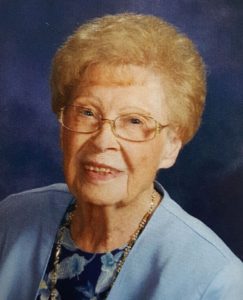
My wife’s aunt, Faye Irene (Moler) Pohl, passed away on July 18, 2017, in Wichita Kansas. She had gone there for surgery, an extensive surgery for one who was 90 years old. She didn’t survive this, passing away less than a week later.
I first met Faye in October, 1975. I was dating Lynda at the time, things were getting a bit serious between us, so I was obliged to make the trip to the hometown and meet the family. After a late arrival and a night’s sleep, we walked the two blocks from my (then future) mother-in-law’s house to Faye’s. Her husband was in the midst of remodeling a large home in Meade. I didn’t see a lot of Faye on that trip, as there was much to do and many people to see. But we ate Sunday dinner at her house, and I could clearly see she was a gracious hostess and a good cook.
Over the years, I’ve had many chances to be with and see Faye, always at family times. We made trips to Meade, she and her husband Leonard made trips to where we were, and I got to learn much about her. Her gifts as a hostess I saw demonstrated many times, in meals large and small. She always had a nicely set table, a balanced meal fixed, and desserts at the ready. She also always urged second or third helpings on me. Yet, I’m not going to blame my lingering though shrinking obesity on her. I did that all on my own.
Faye’s life was spent mostly in Meade County, Kansas. She was born in Meade, the county seat, but the family soon moved a few miles north of town to the silica mine, where her dad, Millard Moler, was the crane operator. Her first seven years of school were at the Artesian Valley School, a one-room, rural schoolhouse. The family moved back to Meade in time for Faye’s 7th grade year. She lived in Meade, or on a family farm south of Meade for most of the next two decades. Briefly the family moved to Colorado then Idaho, but was back in Meade by 1973, stayed there until the late 1990s, when Leonard retired and the moved to Hutchinson Kansas. After Leonard’s death in 2005, Faye moved back to Meade for the remainder of her live.
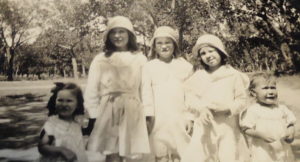
For those of you who don’t know the Kansas high plains, it’s bleak, dusty, and windy. Part of the so-called “Great American Desert”, it’s devoid of trees except where the town folk plant and nurture them. It’s farming country, traditionally for winter wheat, though more recently for corn, always with other crops mixed in. If you aren’t a famer or farmer’s wife, you are working to somehow support agriculture. The land isn’t quite as flat as you might think. It’s gently rolling, with a fair amount of true flatland. Farmers have done some major earth moving and flattened miles and miles to make the land more suitable for easy farming. Despite the bleakness, I fell in love with the Kansas prairies a long time ago.
That was an aside to say that Faye learned to be prepared for weather on the prairies. I remember stopping at a cemetery in Spearville, Kansas, at Faye’s request. We were taking her from Meade to Hutchinson sometime after her husband died. She and Esther had an uncle buried there, who had died as a boy in an accident with some horses, before the family moved to Meade. She wanted to see his grave, which she hadn’t seen for a long time. We found the cemetery, on the prairie north of Spearville. The minute we got out of the car that wind hit us hard—not a storm; the wind just blows constantly. I noticed that Faye already had on a clear-plastic rain hat, to protect her hair from the wind. She must have pulled it from her purse and put it on before leaving the car. Yes, she was well prepared for what the prairie would throw at her, that time, and every time.
Faye was active in her husband’s accounting business in Meade, as well as on the farm for the years they lived there. She was a life-long member of the Church of the Nazarene, teaching Sunday School, singing in the choir, and taking various positions of service within the church. Faye demonstrated the heart of a servant in all she did. Her ministries extended beyond the local church. She served as treasurer of the Women’s Christian Temperance Union, and was active in Country Gospel Music Association events, singing with other family members.
Faye will be missed much. She enriched the lives of those she met and interacted with. She lived her last twelve years as a widow, and survived cancer during that time. She’s now singing the old hymns and choruses in the celestial choir—with maybe a little country gospel mixed in.
A Long Vacation
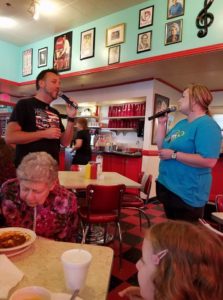
Every now and then I see something that says that Americans take shorter vacations than we did 40 years ago, or whatever timeframe yo want to pick. I suppose that’s true. Many people never take a week-long vacation these days, let alone two weeks. They opt for four and five day weekends. Which is better: the long vacation or the long weekend?
Lynda and I were just on a two-week vacation (almost) with our daughter and her family. They arrived from Oklahoma City late on June 19. The next morning we drove east, in two vehicles, to Indianapolis. Strange place to vacation, you ask? Not when it’s time for the Church of the Nazarene’s quadrennial meetings. Three general conventions of the missions, youth, and educational organizations, followed by the General Assembly, the governing body of the denomination. Richard, our son-in-law, was a delegate to the missions society General Convention. They asked us to go along to help with the kids, as they decided to make a family trip out of it.

Richard was tied up the 21st through 23rd with the convention. I took him to downtown, to the convention center, from the rental house we had three miles away. It was an older, three-story house that was nicely restored. The floors creaked, but the house functioned quite well. The Wi-Fi and coffee maker worked, as did the microwaves, and it had a nice front porch with chairs and table. What more could you ask for?
I won’t go into all the activities we did. Needless to say, with four children, and with me getting sick one day and Lynda not feeling well on a couple of days, we probably did less than we thought we could. On Friday we went to see the expo hall associated with the general conventions. The kids had a good time in the bouncy play place. Lynda stayed with them while I walked the exhibits. I bought one book, saw a couple of friends, and had a good time. We al

so went to the Sunday morning service, and met up with a friend from more than 40 years ago. It was all quite enjoyable.
Then, on Monday, June 26, we drove from Indianapolis to Branson Missouri for the second leg of the trip. Here we stayed in a condo we were able to book using points from our timeshare: same resort company, but different resort from where we own. So, we had no out-of-pocket expense for the accommodation. It was two story, with two large bedrooms (one up one down), and two pull-out couches. It is central to just about everything in Branson.
The week was interrupted, however, because we had a gap in having someone to watch Lynda’s mom. So on Tuesday afternoon I drove to our house, only two hours on back roads, and spent that night with her. Wednesday afternoon I drove back to Branson with her, and she was able to spend a little time with her great-grandchildren and eat dinner with us. I drove back late that evening, and left early the next morning for Branson. That was the day we planned to go to Silver Dollar City, so I was on the road by 7:30 a.m.

For those reading the blog who don’t know about Silver Dollar City, it is truly amazing. It’s a theme park, with clusters or rides appropriate for all ages. It’s a crafters’ location, with such things as blacksmithing, candy making, glass blowing, and more. Of course, there are many, many opportunities to be separated from your money. If you avoid, those, and concentrate on the rides and crafts, it is really a lovely place. I was last there in October 2014, and have been there (I think) three other times in my life. There’s still much I haven’t seen. Lynda and I are thinking of going back sometime this fall, though we’ll see.
We played miniature golf twice. The first time we didn’t keep score, the second time we did, and I beat Richard by one stroke and Lynda by two. Sara was only a couple behind that. The three older kids enjoyed it a lot, though they were certainly rambunctious, and keeping them where they were supposed to be, and not bothering other players, was a constant battle.
I won’t mention everything we did in Branson. We did quite a bit; not always the whole group of us, but everyday saw some activity. Then, on Saturday July 1, we made the two hour drive home. That afternoon, the kids rode bikes, Ephraim caught two snakes and several toads, the parents rested, and I took the kids blackberry picking. The boys grew tired of it and went back to the house, but Elise stuck it out. The next day was church at our home church, and an afternoon of more snakes, toads, play, and blackberry picking.

The OKC group drove back last night, through a rainstorm, and got home around 11 p.m. The Bella Vista three took the occasion to watch a movie, and just read. I kept thinking about those that left us, and they there is no quiet for them, at least not for another 18 years.
So, all the posts over the last two weeks were written ahead of time and scheduled to go live on my regular posting days. I’m back in real time now. Back to the daily grind on Wednesday, back to my writing “career” today.
Relaxing?
I’m writing this post ahead of time, to go live Friday June 30. At that time, I’ll be on vacation with the family in Branson, Missouri, the day before ending our trip. The question is, will I be relaxing or not?
From June 20-25 we were in Indianapolis, where our son-in-law, Richard, was a delegate to some of our church quadrennial meetings. Since Richard and Sara decided to make a family trip out of it, Lynda and I are along mainly to help. I write this before we even left. Our preparations for the trip are stressful. I can only imagine what Richard and Sara are going through.
We leave (or left, as you’re reading this) for Branson on June 26. There’s plenty to do there. Silver Dollar City will be on the agenda, as will a show, and probably a movie. Maybe even relaxing by the pool. Possibly the grandkids will allow us time to get a little reading in.
But, will I be able to relax? It’s been a busy time at work and home. I certainly need to decompress a bit. I’m just not sure this vacation is going to do the trip.
I’m scheduling this to post on the 30th. Possibly I’ll find time to come back and edit in some things about the trip, and report on my being able to relax.
Unwinding From The Weekend
I’m at work, at my desk, trying to figure out how to be productive today. We spent the weekend in Oklahoma City, on a dual family event. Ezra’s birthday was March 1, and we celebrated this weekend. Elijah’s dedication was Sunday. So all four grandchildren have been dedicated to God’s care and service.
Since these were two family events, and since some people would be driving in for them but wouldn’t want to spend the night, both took place on Sunday: the dedication during the normal worship service; and the party right after at Incredible Pizza. This is 50,000 sq. ft. of mayhem. Noisy, crowded, chaos. The kids liked it, and that’s what matters. We were there a couple of years ago for Ephraim’s and Elise’s birthdays.
So today it’s back to the grind, at work and at home. I had my manuscript with me over the weekend, but only managed to look at 30 or so pages. That will be my main writing focus this week, that and re-publishing Doctor Luke’s Assistant. My proof copy should arrive this week. If it’s good, I’ll get the print and KDP and Smashwords editions republished this week.
Mourning—It Never Gets Easier

Feb 10, 1948. A beautiful, Spring-like day in southwestern Kansas. That evening, three young people headed from Meade to Fowler, adjacent towns between Dodge City and Fowler in Meade County, to attend a dinner among friends. Alas, weather predictions being what they were in 1948, they didn’t know a massive blizzard was just over the horizon. It started snowing while they were eating dinner. Later, around 10 p,m., the three decided to drive the 10 miles back to Meade. They didn’t make it; all three perished in the blizzard.
Saturday just passed was the 69th anniversary of when the first of the bodies was found. I think. Records aren’t clear, memories of things that old are few and fading. Most likely the three died on the 11th, though their bodies might not have been found until the 12th or 13th.
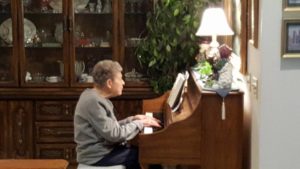
Two of those who died are the younger sisters of my mother-in-law, Esther Barnes. I had heard bits and pieces of the story over the years. About 18 months ago I asked Esther if she would talk with me about it, and let me write the story for the Meade Historical Society website. She said yes, and I interviewed her in our house over a couple of days. It took me a few months to complete and sent to the Historical Society for them to upload. You can read it here. If for some reason that link doesn’t work for you (looks funny to me), try this for the index and click through to the story.
When I interviewed Esther it was 67 years after the event. I knew it would be painful for her, and it was. But she gave me the details she knew about, most of which she heard from someone. She lived in Fowler at the time, newly married and with a 9 month old son. They had no phone, so she only heard about it days later as the news got around.
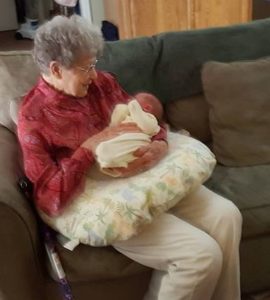
Saturday was the 69th anniversary of that event. At the supper table, Esther said, “I still think about the girls,” by which she meant the sisters. Several times during our meal she teared up. 69 years, and still the mourning goes on.
I understand this. It’s been 51 years since my mother’s death, and I still think of her most days, and wonder what life would have been like if she hadn’t had the terrible illnesses and died from them at age 46. It certainly would have been different. Yes, the years have deadened the mourning some, but it’s still there.
I’m not sure there’s really a point to this post. It’s just something that I want to share.
Oh, if you get to the Meade Historical Society site, you’ll notice the article is listed at the “Buzzard of 1948”. I just notice that, and will ask them to fix it. If you read the article there, you’ll find a number of typos and an some awkward formatting. I remember fixing those, so I must have sent them the wrong file, because I remember fixing those items. Just suffer through them. I’ll find the right file and send it for re-uploading.
Wisdom from Dad: Track Your Finances
Post #2 in my Wisdom from Dad series
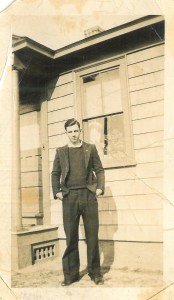
My dad was strongly shaped by the Great Depression. Born in 1916, he went to school only through 8th grade. If he entered school at the normal age we think of today, and progressed on schedule, that would mean he “graduated” about 1930. The worst of times was yet to come, but it was pretty bad that year, with no hope for relief in sight.
At some point Dad went to work for “Old Man Angel”, on his farm in East Providence, probably in the Riverside area. Dad said he earned “a dollar a day plus my dinner.” I’m not clear, so long after Dad told me that, whether this was the job he got after he left school, or if perhaps this was a summer job while he was still in school. I don’t know if that matters. He worked five full days a week, plus a half day on Saturday. What did he do with his $5.00? Took it home, gave $4.50 to his mother for support of the family (he had four younger siblings), then went to Labby’s store. There he took his 50 cents and bought his treat with it. He alternated between as many grapes as 50 cents would buy, or as much ice cream as it would buy. He sat outside the store and ate the grapes or ice cream.
This is the story Dad told, more than once. I believe him. Dad didn’t stay out of school. He soon entered trade school to learn the trade of linotype operator. Hot lead machines that set the type for newspapers or magazines. I’m not sure how many years this school might have been. Dad learned his trade and learned it well. As soon as he graduated from trade school, he went to work at
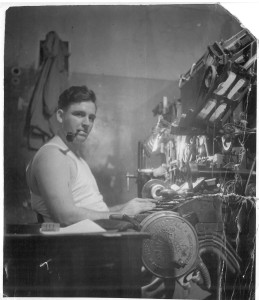
the Delmo Press in Pascoag, R.I., working there until he went in the army for World War 2, and for a brief time after the war till he went to work for the Providence Journal.
My guess is Dad probably graduated from trade school around 1933 or 1934. This was now some of the darkest days of the Depression. No doubt Dad felt himself fortunate to have a job, and to keep it. They say the Depression shaped the Greatest Generation into being a frugal lot. My dad was an extreme case of this. The young man of 1936 would not have sat outside Labby’s store and eaten 50 cents of anything in one sitting. He would have denied himself any treat and put the 50 cents in the bank. He was that way until he died in 1997. After Mom died and we kids were out of the house, he lived cheap.
How cheap? I could write post after post of how he lived. I’ll give two examples. He did the coupon thing at the grocery store. I imagine he’d love the couponing shows we have now. But, not only did he use many coupons, he tracked his savings, writing down how much he saved and keeping a running total each calendar year. On our phone calls he would often say what his current amount saved for the year was. In true frugalness, he didn’t keep this on a pad of paper. Pads were something you bought new. Dad would never be so extravagant as to do that. No, he took envelopes he received in the mail—bills or junk mail—slit them open, and used the inside and back of the envelope to keep his tally.
The other example was how he would look for dropped change on the ground, usually when he walked his dog. He knew where to look. At the gas station he looked around the air pump and vacuum machine. “Especially after the snow melts,” he told me. Around the newspaper box was another place. It always surprised him how people could drop money and not be bothered to bend down, search for it, and pick it up. But other people’s carelessness was his gain. And, he tracked how much money he found on the ground—and wrote it and added it, you guessed it, on the back of an envelope.
That was all introduction. With us kids, our allowance started when we were 8 years old (I think he started my younger brother a little younger, with a smaller amount). At 8 we received 25 cents a week. It wasn’t a gift. We did chores for that. It doubled every two years, so that at 10 we received 50 cents, at 12 a dollar, at 14 two dollars, and at 16 the whopping sum of $4.00 a week. It stayed there so long as we were in school, even if we had a job. As soon as we left school, the allowance stopped.
As soon as we received the allowance, we had to keep track of our money. Dad made each of us three kids matching banks, just different enough that we could tell which one was ours. Each Thursday, which was his payday, we had to present our “accounts,” and, if the total in our little notebook didn’t add up to the amount of money in the bank, we would not receive our allowance.
You think I’m joking? Not one bit. Week by week, year by year, for eight years, we kept our accounts, and Dad checked them. If we had a discrepancy, we made sure to find it first, figure out if we had bought something we’d forgotten to write down, and wrote it. Each entry had to have a date. Now, before you think Dad was hard on us, I think he often relented when our money didn’t add up. He would help us to remember where it went. Or, if we lost money, he would allow us to write “lost” and an amount, recalculate, and give us our allowance, with a promise to do better next time.
When we reached 16, and our allowance went to $4.00 a week, we no longer had to account for our funds to get our allowance. Dad wrote in our books, something like Your 16 now. If you haven’t learned how to handle your money by this time, I can’t help you any more. And, he added encouragement to be frugal, responsible, and disciplined in our approach to money.
I can’t tell you how happy I am that Dad put us through this discipline. I won’t say I’ve done it as rigorously now as I did when the every-Thursday reckoning came around. But I still track my funds. I still balance my checkbook. If the amount is off by even a penny, I search until I find the mistake. I keep a spreadsheet of every non-cash purchase, but including cash withdrawn, and put them into categories, add them up. If they don’t match the total in the checkbook, savings, and H.S.A. account, I have to find the discrepancy. I kind of wish I had saved my account notebooks (they were small—the kind that fit in a shirt pocket—and my bank. They would be nice keepsakes now.
I wonder if my biggest failure as a parent was that I didn’t keep this discipline with my children. Of course, for a time their accounts would have been in dinars and fils, rather than dollars and cents, but, hey, it’s still money. Maybe, even without this, I transferred some sense of the right way to be disciplined with money. I hope so.
Writer Interview: A.D. Vick
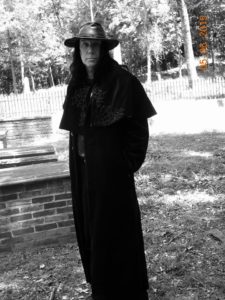 Every family probably has a writer or two in it. Previously I’ve interviewed a first cousin who is a writer and who’s published her books. Today is an interview with another cousin, in this case a second cousin, A.D. Vick. A.D.’s dad and my dad were first cousins. They spent a lot of time together growing up, and were in touch regularly as adults. It helped that our two families attended the same church, the Vicks sitting right behind the Todds on the first and second pews, left side.
Every family probably has a writer or two in it. Previously I’ve interviewed a first cousin who is a writer and who’s published her books. Today is an interview with another cousin, in this case a second cousin, A.D. Vick. A.D.’s dad and my dad were first cousins. They spent a lot of time together growing up, and were in touch regularly as adults. It helped that our two families attended the same church, the Vicks sitting right behind the Todds on the first and second pews, left side.
A.D. is the oldest of three children, and three years ahead of me in school. We saw a lot of each other before college years, even at the shore in summers. I remember visiting his grandfather (my great-uncle) a number of times while his family was there also.
A.D. was from Providence, Rhode Island. In the late 1970s he moved to Fayetteville, Arkansas, and has lived there ever since. I got to northwest Arkansas in 1991, but didn’t know he was 30 miles down the road from me, something I learned in 1997. It wasn’t until May 2016 that we saw each other, though through the miracle of Facebook we had reconnected earlier than that.
At some point I learned A.D. was a writer. His tales could be considered part of the goth subculture, that…well, I think it’s best now to let this be in his own words.
You state you are part of the Goth Culture. But many people don’t really know what that is, or they think of it as a teenage phase. Can you give us a quick summary of what it means to be Goth?
Vick: Modern goth culture grew out of the post-punk movement during the early 1980s in Great Britain. The music that came to be called goth rock and dark wave had a darker feel to it than the better-known new wave that enjoyed a lot of popularity at the time. If the goth culture has a theme song, it would have to be Bela Lugosi’s Dead, by Bauhaus.
Goths in general, see beauty in darkness and accept darkness as a part of life. Yes, many enjoy the macabre, like to spend time in cemeteries (as do I) and enjoy dark fashion, which exists in great diversity. We are a harmless lot however, and would rather spend time reading, watching horror movies, drinking tea in graveyards, or writing poetry than causing any trouble.
Contrary to belief, there is no age limit to goth. While there’s little doubt that for some teenagers, goth is just a phase, many embrace the culture for a life time. It’s who they are.
 You have a book out, Tales of Dark Romance and Horror. Tell us a little about it. How did you come to write it?
You have a book out, Tales of Dark Romance and Horror. Tell us a little about it. How did you come to write it?
Vick: I see Tales of Dark Romance and Horror as sort of a documentary on my writing style. The book contains 12 short stories and one novella. I’m a romantic at heart and most of the material in the book reflects that. Still, I can look at the work contained within its pages as a reflection of my evolution as a writer.
My greatest literary inspiration is Edgar Allan Poe. I can vividly remember being stretched out on my bed reading his fiction as a child, and I firmly believe that it was he who inspired me to stay firmly in the realm of the short story. Other inspirations include H.P. Lovecraft, Anne Rice, and Charles de Lint.
I can still remember being taken somewhere with my parents as a child and at times, sitting and writing fiction to amuse myself. I always enjoyed writing and have indulged myself in many different aspects of that craft over the years. Still, I really like using grammar and punctuation creatively, which is something you simply cannot do if you’re doing technical writing, for example. So, between my love of fiction, my enjoyment of the macabre, and my love for romance and the creative use of language, I decided to write the book.
Are the stories stand-alone, or are they part of a series?
Vick: Some is part of a series and some is stand-alone. Three stories comprise my Raven series. Raven is a dead woman who comes back to this reality from the land of the dead to meet with her love, who still lives in the flesh, and to play violin in a metal band. Then, there’s my Sea Haven series, which I place on North Carolina’s outer banks. These two stories center around a couple of goth women who are best friends and the last of what was once a thriving culture in their locale. There are two other stories contained in the book that belong to my A Fall From Grace series. This is vampire fiction.
Even though the other stories are stand-alone, there are ways in which some of them intersect. For example, both my Raven series and the novella Rosalie center around a fictitious town I call Fox Grove, which I place in Newton County, Arkansas. The characters differ but I like using that locale.
Give us an idea of a typical plot. Take one story and walk us through it.
Vick: My style seems to be evolving and I’m not sure that there is a typical plot. The one constant, however, is that most of my material involves a mix of both romance and horror. So, I would like to use Night of the Harvestmen, which made me the 2014 Writer’s Workshop winner at Horror Addicts Dot Net.
The story, which is told in the first person, opens with the protagonist shouting with glee as he watches his house burning down. After the opening scene, the plot flashes back to a seemingly chance encounter he has with a young woman on a street in North Charleston, South Carolina. The lady has an incredible effect upon him and it takes days for him to get over her; this, even though nothing of significance took place between them.
Our hero returns to his rural home to find that he must deal with an infestation of harvestmen (daddy long legs), which seem to be gaining control of his house. After a week or two of battling with them, his abode is finally free of them. A friend reminds him that there is a goth music festival coming up on the weekend; and after battling the harvestmen for so long, he’s excited about attending. Upon his arrival, he spots the same lady he’d briefly encountered in North Charleston. They hit it off and she goes home with him. Our hero has found the love of his life and is in bliss until something goes terribly wrong.
What’s in store next? Are you working on more stories, or another book?
Vick: I’m currently working on a story called The Arrival of Narkissa Laveau. This is to be the last story I’ll write for a new book. This new publication will be smaller than the first and will contain seven stories. Still, I feel that it would be advantageous to get a second book published. While I haven’t settled on a title for this upcoming publication, I’ve arranged for someone to do a bit more art work for it and I have a picture that I believe will serve as an excellent cover photo. I hope to publish by the end of winter or early spring.
Al’s book can be found at Amazon.com:
Recovering From The Weekend
As I was not too long ago, I’m again a day late with my blog post. It’s not for lack of something to write. Indeed, I have a choice of topics and ideas. Some things I’m not quite ready to write a post on, though, if I needed to, I could break out a short, introductory post, and leave the bulk of it till I’m ready. Other things I’m ready to write on.
So why didn’t I write yesterday? Sheer tiredness and brain weariness. This last weekend we had a yard sale, the one we were supposed to have any time after August 2015 when my mother-in-law came to live with us. We didn’t get it done last fall, and I was too busy this spring with many projects to do it. A summer yard sale works in this part of the world, but not as well as spring or fall.
So, about two months ago I decided I would get it done in October. All I needed to complete before that was the flower bed in the front yard. I completed that in early October. My wife was gone to Oklahoma City for an extended stay helping with grandkids, and my mother-in-law was gone for months visiting in her home town. I got much done during those two weeks, both inside and outside the house, and still more in the three weeks it was just me and the mother-in-law here.
Projects completed, and a visit to OKC out of the way, I began yard sale prep in earnest. My wife returned on Oct 23, and I said we were having the sale Oct 28-29. She didn’t think we could get it done, but I showed her how much I had done, and said we would proceed with it. So we did. Was it a success? I had set only modest goals: sell one box of the old books; sell the old porch swing, old suitcases (from 1981), unused air purifier and dehumidifier, and a box of farm junk left over from the 2009 sale when my mother-in-law first downsized, from a house to an apartment. Oh, I also set a $ goal of $200.
I’m happy to say that each of those goals was met. We netted around $220, and each of the items mentioned in the previous paragraph are gone—sold! I think more of the stuff selling was ours, rather than the mother-in-law’s, but it’s gone, never to take up space in the garage or basement again. However, I have to say that meeting all goals seems to be almost a wasted effort. When we brought things back in the garage, we have just as many tables set up, just as many items we don’t need but don’t feel clear to throw out, and we still can’t get a car in it. And, it was a lot a lot of work for a lousy $220.
Some other benefits were achieved. We found a set of salad plates that were not to be sold. In getting ready for the yard sale I was able to fully clean the storeroom. We had contact with some neighbors and near neighbors we rarely see. I expended a lot of energy, perhaps lost a little weight, which is a good thing even if I didn’t have my annual physical tomorrow.
But I ended the days exhausted. Sunday wasn’t all that restful, as I had to teach adult Life Group, made my Saturday run to Wal-Mart on Sunday, and did some good writing on my novel-in-progress. I had to do most of the work on the sale, as my wife woke up with back spasms on Friday, and wasn’t any better on Saturday (or on Sunday for that matter, though improved some by Monday), but I expected that. I took an extra pain pill or two each day, kept going, got lots of steps in, and then slept well.
But, Monday came, and the rush of adrenalin that comes from a sale was gone, and the tiredness set in. I probably didn’t earn my pay yesterday, though looking back I did get some good things done, including a couple of difficult tasks that involved using a website so changed from what I’m used to it might as well have been a new site. At home in the evening I got supper ready (just leftovers from the roast I cooked Sunday—oh, yeah, that was another energy-sapping thing). After eating I balanced the checkbook, then went to The Dungeon. Stock trading accounting took over a half hour, as there was much to do with it, then I wrote. I only added 625 or so words to Preserve The Revelation, but I crossed another thousand threshold, which was satisfying.
Hopefully today my energy has returned. Just being able to write this blog post is a good sign. Future posts will hopefully get back to my writing career and life lessons. Stay tuned.
Yard Sale Today
I’m not making much of a post today, as we are having a yard sale. Back in early 2009 my mother-in-law moved from her house to a nearby apartment. We had a sale then, getting rid of most of the furniture she didn’t need/we didn’t want. But we put several boxes on the shelf. Then, in March 2014 she went to live in an independent living retirement apartment, smaller, and she didn’t need as much. Several of her things came to our house; some to the basement; some to the garage.
The, in August 2015 it was determined she couldn’t live alone any more. It was either assisted living (more than $4000 a month) or move in with us. We had her move in with us. We sold off some of her things, but most of it went into the garage, a little going to the basement.
Our plans all along were to have a sale, adding a fair amount of our own stuff. But other things got in the way. All winter I was reclaiming the back yard from the forest. All spring and summer I was trying to spiff up both the back yard and front yard. Then there was finishing the flower bed so we’ll have someplace to plant next year, and clean up the basement storeroom. I had a number of reasons for doing that, including finding and moving things to the garage for the sale.
That stuff all being done, while the wife was out of town helping our daughter’s family with the new baby, I began moving stuff to the garage, and arranging for tables, and arranging stuff on tables. It’s now or never for this sale.
So, today and tomorrow, Friday and Saturday, the sale is ON. We live in a somewhat remote place, and to be honest I don’t expect a lot of traffic. If we can sell some of the stuff I’ll be happy. I’ll take a bunch more to thrift stores, while we’re in the mood to declutter and reduce our overall amount of stuff, accumulated in almost 41 years of marriage. And, what my mother-in-law accumulated in 91 years.
So, I wrote nothing last night, as I was making preparations. I’ll write nothing tonight. Maybe I’ll get to do a little Friday night, but we’ll see. I suspect that Saturday I’ll be too tired to write, but again we’ll see.
I’ll be back Monday, and will report in on how we did.